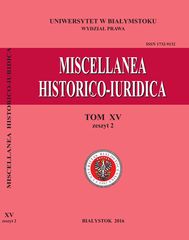Hayek, common law i teoria spontanicznego porządku – problemy Hayekowskiej analizy angloamerykańskiej kultury prawnej
Hayek, common law and the theory of spontaneous order – some problems with Hayek’s analysis of the Anglo-American legal tradition
Author(s): Włodzimierz GogłozaSubject(s): Law, Constitution, Jurisprudence, History of Law, Political Philosophy
Published by: Wydawnictwo Uniwersytetu w Białymstoku
Keywords: F. A. Hayek; theory of spontaneous order; common law; evolutionary theory of law; polycentrism
Summary/Abstract: The theory of spontaneous order is widely regarded as one of the most important contributions of F.A. Hayek to the development of social sciences. Hayek’s main example of an emergent order is the classical (Medieval and Early Modern) common law. In his account, common law is not only a result of spontaneous evolution but also the main source of the unusual amount of freedom the early modern Englishman enjoyed compared to his European counterparts. In this paper I discuss some problems with Hayek’s analysis of the historical development of common law. In particular I criticize his claim that classical common law was based around precedents, and stress the surprising – given his economic views – lack of appreciation for the role competition between different courts played in the development of English law up until the nineteenth century. In conclusion I argue that polycentric legal order is the proper foundation for Hayek’s “constitution of liberty”.
Journal: Miscellanea Historico-Iuridica
- Issue Year: 15/2016
- Issue No: 2
- Page Range: 169-192
- Page Count: 24
- Language: Polish

